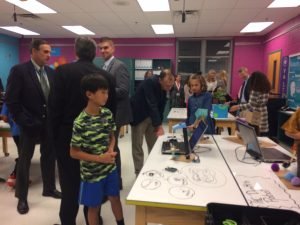 Cedar Point Elementary School in Bristow launched its Thinkabit lab, Oct. 19; a cooperation with Virginia Tech and Qualcomm Technology, it is the second its kind on the east coast.
Cedar Point Elementary School in Bristow launched its Thinkabit lab, Oct. 19; a cooperation with Virginia Tech and Qualcomm Technology, it is the second its kind on the east coast.
The Thinkabit lab is a STEAM space where students in grades K-6 can come to learn to code and apply the science to their creative projects.
Each class spends a full day working on a STEAM project in the lab environment under the direction of their STEAM teacher who has been trained by Qualcomm and Virginia Tech.
Thus far, the projects have involved learning simple coding and applying it to a creative application of the students’ own design. In the near future, Cedar Point hopes to invite other Prince William elementary classes to visit and use the lab.
Principal Mark Marinoble explained that the lab is designed to prepare students for the STEAM jobs of the future. “Skills to be flexible and adaptable in a workplace we can’t yet imagine.”
Marinoble and STEAM teacher Adair Solomon started talking about creating a STEAM lab after her STEAM encore class took a field trip to a similar Thinkabit lab in Falls Church, the first outside of San Diego.
There, Cedar Point educators noticed their students were so fully immersed in their learning experiences that they did not want to leave. One child said it was better than a trip to Disney World.
The educators also realized that the children were experimenting and were not deterred by “failures,” as they worked towards a successful application.
“That experience at Falls Church changed us,” said Marinoble, and he and Solomon started thinking about bringing the experience closer to home, asking “How can we partner with the university?”
After much discussion, Marinoble and Solomon reached out to Virginia Tech and Qualcomm. Excited about the collaboration, the two entities agree to partner with the school. Qualcomm even sent two of its engineers to Cedar Point to help establish the lab.
Soon, all Cedar Point elementary students will have a chance to spend a day in the lab, learning and creating like 21st century engineers.
“Everyone who comes in here is an engineer. Kids are saying ‘I’m an engineer’ in second grade,” said Marinoble.
Solomon hopes to adopt the curriculum plan, so even kindergarteners can experience the Thinkabit lab, and he is planning to make the lab a division-wide asset.
Marinoble envisions every Prince William elementary student visiting the lab on a field trip, and spending a day inventing just as Cedar Points students did when they visited the Virginia Tech lab on the Falls Church campus.
He even believes the model can be replicated on the other side of the county, making it even more assessable to Prince William students.
After a presentation for parents, introductory speeches and words of praise from elected officials, parents and special guests were invited to visit the lab to see the students’ creative inventions.
Solomon explained that the students learned to operate two different motors via two kinds of simple coding. One motor creates a circular motion and the coding controls the speed of the motor. The other motor works via an open/shut motion, and the students program it by applying the angular measurements.
Students learned both types of coding, and then working in pairs and apply them to a creative DIY project of their own design.
Christian Johnson and Pablo Portillo, 5th grade students, created a project in which a small toy bear blocks pucks as in a hockey game. The project also has a working elevator.
Matthew Barber and Lexie Brazier, of the 5th grade, improved upon a system created by other students that uses a small teddy bear to sort small balls before they slide down a tube.
“It was really fun fixing all the problems and making it work,” said Brazier, who was excited to see the end result.
Vendansh Mathur and Parth Kothari made a clock face with one swooping hand, using the circular coding. They also made a project inspired by the book “The One and Only Ivan,” proving science can incorporate art and literature.
“I like because we got to use our creativity,” said Mathur. “It was nice to see what we created.”
All of the children enthusiastically demonstrated their creations and chatted about them with school board members, including Chairman Ryan Sawyers, Brentsville member Gil Trenum, and Brentsville Supervisor Jeanine Lawson.
Trenum, who was recently back from military service in Africa, noted that this kind of lab would not be possible back when many of the elementary schools in Brentsville were still overcrowded.
Lawson praised Solomon for being a dedicated teacher and the kind of person that made things happen.
Support Bristow Beat - Donate Today!